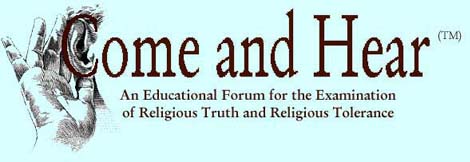Was Jesus a Jew?

Blood Ritual: — Judaism embraces blood ritual. Some blood sanctifies, some blood defiles. Let's see what the Talmud doctrines are.
| Navigate This Site | |
 | |
| Home | |
| Valentine | |
| Dilling | |
| Talmud | |
| The Rabbis | |
| Supplement | |
| Glossary | |
| Download | |
| Admin | |
| | |
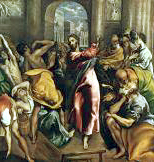
Jesus Threatens Sacrificial System
Christ Driving the Traders from the Temple by El Greco,
And the Jews' Passover was at hand, and Jesus went up to Jerusalem.
And found in the temple those that sold oxen and sheep and doves, and the changers of money sitting:
And when he had made a scourge of small cords, he drove them all out of the temple, and the sheep, and the oxen; and poured out the changers' money, and overthrew the tables; — John 2:13-15 (KJV)
And they come to Jerusalem: and Jesus went into the temple, and began to cast out them that sold and bought in the temple, and overthrew the tables of the moneychangers, and the seats of them that sold doves;
And would not suffer that any man should carry any vessel through the temple.
And he taught, saying unto them, Is it not written, My house shall be called of all nations the house of prayer? but ye have made it a den of thieves.
And the scribes and chief priests heard it, and sought how they might destroy him: for they feared him, because all the people was astonished at his doctrine. Mark 11:15-18 (KJV)
His attack on the animal sacrifice system may have been the last straw. Shortly after, the scribes and Pharisees arranged to have Jesus crucified.
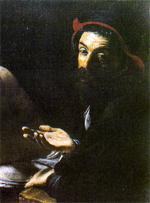
Christ Before Caiaphas by Giovanni Battista Caracciolo (detail of the High Priest Caiaphas). This from the Gospel of Matthew Chapter 26:
And they that had laid hold on Jesus led him away to Caiaphas the high priest, where the scribes and the elders were assembled.
But Peter followed him afar off unto the high priest's palace, and went in, and sat with the servants, to see the end.
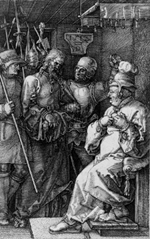 The Engraved Passion, Christ Before Caiaphas by Albrecht Durer, 1512 (Caiaphas rending his clothes)
The Engraved Passion, Christ Before Caiaphas by Albrecht Durer, 1512 (Caiaphas rending his clothes)
Now the chief priests, and elders, and all the council, sought false witness against Jesus, to put him to death;
But found none: yea, though many false witnesses came, yet found they none. At the last came two false witnesses,
And said, This fellow said, I am able to destroy the temple of God, and to build it in three days.
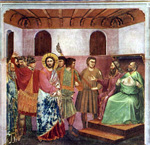 Christ Before Caiphus, Giotto, 1304-1306 (Caiphus rending his clothes)
Christ Before Caiphus, Giotto, 1304-1306 (Caiphus rending his clothes)
And the high priest arose, and said unto him, Answerest thou nothing? what is it which these witness against thee?
But Jesus held his peace, And the high priest answered and said unto him, I adjure thee by the living God, that thou tell us whether thou be the Christ, the Son of God.
Jesus saith unto him, Thou hast said: nevertheless I say unto you, Hereafter shall ye see the Son of man sitting on the right hand of power, and coming in the clouds of heaven.
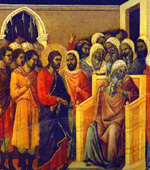 Jesus Before Caiaphas, by Duccio di Buoninsegna, 1308-1311 (detail, Caiaphas rending his clothes)
Jesus Before Caiaphas, by Duccio di Buoninsegna, 1308-1311 (detail, Caiaphas rending his clothes)
Then the high priest rent his clothes, saying, He hath spoken blasphemy; what further need have we of witnesses? behold, now ye have heard his blasphemy.
What think ye? They answered and said, He is guilty of death. — Matthew 26:57-66
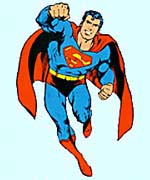
You can help in the battle for Truth, Justice, and the American Way! Fight the forces of censorship and suppression of the Talmud, and bring about understanding between peoples of different faiths.
Download this site to your desktop computer.
Make CDs and distribute them to friends, neighbors, ministers, and community leaders.
Email your favorite essay to your email list.
Post your favorite essay to discussion forums.
Print your favorite essays and give them to those not on the Internet.
Flyers advertising Come-and-Hear.com can be distributed throughout your community.
 Genuine Come and Hear™ CDs do not contain executable programs. When making CDs, do not include any files that end in .exe, .com, .bat, .vbs, .doc, .pif, .sit, or .scr. The person receiving the CD should use his own browser to view the files. This helps to protect him from harmful programs and viruses.
Genuine Come and Hear™ CDs do not contain executable programs. When making CDs, do not include any files that end in .exe, .com, .bat, .vbs, .doc, .pif, .sit, or .scr. The person receiving the CD should use his own browser to view the files. This helps to protect him from harmful programs and viruses.
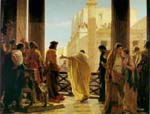
Ecce Homo, Pilate presenting Jesus to the crowd, Antonio Ciseri, 1821-91. This from the Gospel of John, Chapter 18:
Then led they Jesus from Caiaphas unto the hall of judgment: and it was early; and they themselves went not into the judgment hall, lest they should be defiled; but that they might eat the passover.
Pilate then went out unto them, and said, What accusation bring ye against this man?
They answered and said unto him, If he were not a malefactor, we would not have delivered him up unto thee.
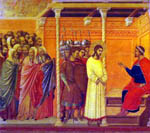 Pontius Pilate's Second Interrogation of Christ, by Duccio di Buoninsegna, 1308-1311
Pontius Pilate's Second Interrogation of Christ, by Duccio di Buoninsegna, 1308-1311
Then said Pilate unto them, Take ye him, and judge him according to your law. The Jews therefore said unto him, It is not lawful for us to put any man to death:
That the saying of Jesus might be fulfilled, which he spake, signifying what death he should die.
Then Pilate entered into the judgment hall again, and called Jesus, and said unto him, Art thou the King of the Jews?
Jesus answered him, Sayest thou this thing of thyself, or did others tell it thee of me?
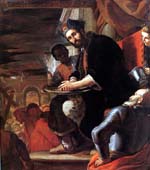 Pilate Washing His Hands, Mattia Preti, 1663
Pilate Washing His Hands, Mattia Preti, 1663
Pilate answered, Am I a Jew? Thine own nation and the chief priests have delivered thee unto me: what hast thou done?
Jesus answered, My kingdom is not of this world: if my kingdom were of this world, then would my servants fight, that I should not be delivered to the Jews: but now is my kingdom not from hence.
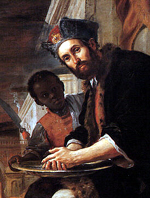 Pilate therefore said unto him, Art thou a king then? Jesus answered, Thou sayest that I am a king. To this end was I born, and for this cause came I into the world, that I should bear witness unto the truth. Every one that is of the truth heareth my voice.
Pilate therefore said unto him, Art thou a king then? Jesus answered, Thou sayest that I am a king. To this end was I born, and for this cause came I into the world, that I should bear witness unto the truth. Every one that is of the truth heareth my voice.

Pilate saith unto him, What is truth? And when he had said this, he went out again unto the Jews, and saith unto them, I find in him no fault at all.
But ye have a custom, that I should release unto you one at the passover: will ye therefore that I release unto you the King of the Jews?
Then cried they all again, saying, Not this man, but Barabbas. Now Barabbas was a robber. — John 18:28-40
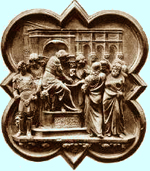
Pilate Washing His Hands, Lorenzo Ghiberti, 1403-24, carving on door, Baptistry, Florence
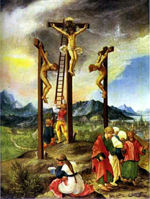
Crucifixion, by Albrecht Altdorfer, c.1526; Oil on panel;
And at the ninth hour Jesus cried with a loud voice, saying, Eloi, Eloi, lama sabachthani? which is, being interpreted, My God, my God, why hast thou forsaken me? — Mark 15:34
And about the ninth hour Jesus cried with a loud voice, saying, Eli, Eli, lama sabachthani? that is to say, My God, my God, why hast thou forsaken me? — Matthew 27:46
Speaking from the Cross, Jesus used David's words from Psalm 21:
My God, my God, why hast thou forsaken me? … — Psalm 22:1
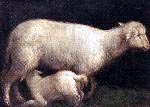
Sheep and Lamb by Bassano c. 1560 (18)
"Many Orthodox Jews and Fundamentalist Christians actively support the rebuilding of the Temple in Jerusalem. The Christians who agitate for this restoration do so because they believe it is God's will that sacrificial religion be restored. They see the resumption of Temple worship as a sure sign of the Second Coming of Christ. And those Jewish people who are anxious to see the resumption of Temple worship believe that ever since the destruction of the Jerusalem Temple, almost two thousand years ago, God has been awaiting the resumption of animal sacrifice … And among Jewish people, there are prescribed prayers for the restoration of sacrificial worship. 'Lord Our God, look with favor on Thy people Israel their prayer. Restore worship to Thy Temple in Zion and with loving grace accept Israel's offering and prayer.' The Traditional Prayer Book for Sabbath and Festivals" — Humane Religion (15)
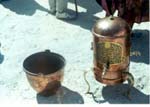
Temple Vessels for the future Temple of Jerusalem
"Two of the important treasures for the worship in the Third Temple that we have in our center. The right-hand one is used by the priests for washing and purifying their hands and feet before going to worship and the other was used to carry the holy water in the worship. (Exodus 30:17-21)" — Temple Mount Faithful (20)
"More than ever, the Temple Mount and the vision of the rebuilt Temple have become the focus of Israel and the entire world. The activities of the Movement have been instrumental in bringing this about. When we started, we were like a voice in the wilderness … Construction of the Seven-Branched Menorah: Our wonderful friends continue to donate gold and jewelry for this purpose. Each piece of donated gold brings its construction closer. The Biblical message to our generation is to consider the example set by people who donated gold, silver and funds for the Tabernacle. Their generosity should encourage all of us." — Temple Mount Faithful (20)

Deborah Lipstadt is a professor of modern Jewish and Holocaust studies at Emory University. She also works with the U.S. Holocaust Memorial Museum.
"In truth, that without the anti-Judaism — much of it anti-Semitism — of the New Testament, or at least in the way the New Testament has been interpreted and taught, there would have been no Nazism, and there would have been no Holocaust. I'm not saying that it was inevitable, but it is a direct outgrowth." — Lipstadt (7)
In his pamphlet, The 45 Questions Most Frequently Asked About the Jews, (1) the late William Dudley Pelley makes some outrageous suggestions. Among them, he suggests that Jesus was not a Jew, and He did not subscribe to Judaism. Christians will of course point to passages in the Gospels where Jesus asserts that He came to uphold the Law:
- Think not that I am come to destroy the law, or the prophets: I am not come to destroy, but to fulfil.
- For verily I say unto you, Till heaven and earth pass, one jot or one tittle shall in no wise pass from the law, till all be fulfilled.
- Whosoever therefore shall break one of these least commandments, and shall teach men so, he shall be called the least in the kingdom of heaven: but whosoever shall do and teach them, the same shall be called great in the kingdom of heaven.
- For I say unto you, That except your righteousness shall exceed the righteousness of the scribes and Pharisees, ye shall in no case enter into the kingdom of heaven.
In particular, notice these words: "… except your righteousness shall exceed the righteousness of the scribes and Pharisees, ye shall in no case enter into the kingdom of heaven." Compare those words of Jesus with these words of Jesus:
- Ye are of your father the devil, and the lusts of your father ye will do. He was a murderer from the beginning, and abode not in the truth, because there is no truth in him. When he speaketh a lie, he speaketh of his own: for he is a liar, and the father of it.
- Woe unto you, scribes and Pharisees, hypocrites! for ye are like unto whited sepulchres, which indeed appear beautiful outward, but are within full of dead men's bones, and of all uncleanness.
The link above brings up Matthew, Chapter 23, all of which is worth reading and relevant to the subject.
Why would Jesus tell His followers to use the scribes and Pharisees as a standard of virtue, and then condemn them as spawn of the devil and hypocrites? Jesus' endorsement of the Pharisees (Matthew 5:17-20) is in radical disagreement with other verses in the Gospels. More important are the instances in conversation and action, when Jesus directly opposes the teachings of the Pharisees, and opposes even Mosaic law.
Adultery
Mosaic law is quite clear: Adultery is a capital offense.
- And the man that committeth adultery with another man's wife, even he that committeth adultery with his neighbour's wife, the adulterer and the adulteress shall surely be put to death.
Pharisaic law (the Oral law that later became the written Talmud) also decrees death for adultery. See Sentence and Execution and Accusation and Trial.
When an adulteress is arrested in the act and brought to Jesus, the scribes and Pharisees challenge Jesus on Mosaic law, pointing out that she should be stoned. Rather than agreeing, Jesus intimidates the Pharisees into abandoning the project, and tells the woman, "Go and sin no more."
- And the scribes and Pharisees brought unto him a woman taken in adultery; and when they had set her in the midst,
- They say unto him, Master, this woman was taken in adultery, in the very act.
- Now Moses in the law commanded us, that such should be stoned: but what sayest thou?
- This they said, tempting him, that they might have to accuse him. But Jesus stooped down, and with his finger wrote on the ground, as though he heard them not.
- So when they continued asking him, he lifted up himself, and said unto them, He that is without sin among you, let him first cast a stone at her.
- And again he stooped down, and wrote on the ground.
- And they which heard it, being convicted by their own conscience, went out one by one, beginning at the eldest, even unto the last: and Jesus was left alone, and the woman standing in the midst.
- When Jesus had lifted up himself, and saw none but the woman, he said unto her, Woman, where are those thine accusers? hath no man condemned thee?
- She said, No man, Lord. And Jesus said unto her, Neither do I condemn thee: go, and sin no more
Sabbath
In Judaic law, the Sabbath is a day of enforced rest. No one may do any work, kindle a fire, or even leave his house. Violation of the Sabbath law is punishable by death.
- See, for that the LORD hath given you the sabbath, therefore he giveth you on the sixth day the bread of two days; abide ye every man in his place, let no man go out of his place on the seventh day.
- Ye shall keep the sabbath therefore; for it is holy unto you: every one that defileth it shall surely be put to death: for whosoever doeth any work therein, that soul shall be cut off from among his people.
But to the outrage of the Pharisees, Jesus and his followers harvest corn (grain) on the Sabbath and eat it.
- And it came to pass on the second sabbath after the first, that he went through the corn fields; and his disciples plucked the ears of corn, and did eat, rubbing them in their hands.
- And certain of the Pharisees said unto them, Why do ye that which is not lawful to do on the sabbath days?
- And Jesus answering them said, Have ye not read so much as this, what David did, when himself was an hungred, and they which were with him;
- How he went into the house of God, and did take and eat the shewbread, and gave also to them that were with him; which it is not lawful to eat but for the priests alone?
- And he said unto them, That the Son of man is Lord also of the sabbath.
In verse 2, the Pharisees challenge Jesus, saying he violated the Sabbath. Notice that, in verse 3, Jesus does not respond to the question about the Sabbath, but speaks instead about David eating shewbread, described in 1 Samuel 21. It is apparent from Jesus' reply that He knew it was the Sabbath, but He and His followers were hungry: that is, He had no intention of obeying every "jot" and "tittle" of the law. It is obvious that Jesus is telling the Pharisees — in modern vernacular — to take take a hike.
Pharisaic law concerning useful work on the Sabbath is so strict that even healing is forbidden. As Talmud translator, Rabbi Dr. H. Freedman tells us:
- Healing on the Sabbath itself is forbidden, unless there is danger to life.
— Rabbi Dr. H. Freedman (2)
Thus, when Jesus heals the sick on the Sabbath, He is violating well-established law.
- And it came to pass also on another sabbath, that he entered into the synagogue and taught: and there was a man whose right hand was withered.
- And the scribes and Pharisees watched him, whether he would heal on the sabbath day; that they might find an accusation against him.
- But he knew their thoughts, and said to the man which had the withered hand, Rise up, and stand forth in the midst. And he arose and stood forth.
- Then said Jesus unto them, I will ask you one thing; Is it lawful on the sabbath days to do good, or to do evil? to save life, or to destroy it?
- And looking round about upon them all, he said unto the man, Stretch forth thy hand. And he did so: and his hand was restored whole as the other.
- And they were filled with madness; and communed one with another what they might do to Jesus.
In the 1961 printing of the Soncino Talmud General Index, there are more than seven full pages of entries under the word "Sabbath." Sabbath laws are a very important aspect of Judaism; desecrating the Sabbath is punishable by death. Jesus must have known.
Divorce
Under Mosaic law, divorce is the prerogative of the husband. At any time, a husband can decide that his wife is not to his liking, give her a bill of divorce, and be done with her.
- When a man hath taken a wife, and married her, and it come to pass that she find no favour in his eyes, because he hath found some uncleanness in her: then let him write her a bill of divorcement, and give it in her hand, and send her out of his house.
Jesus takes exception to this law, preaching that marriage is an act of God that man cannot undo. He makes an excuse for Moses.
- And he arose from thence, and cometh into the coasts of Judaea by the farther side of Jordan: and the people resort unto him again; and, as he was wont, he taught them again.
- And the Pharisees came to him, and asked him, Is it lawful for a man to put away his wife? tempting him.
- And he answered and said unto them, What did Moses command you?
- And they said, Moses suffered to write a bill of divorcement, and to put her away.
- And Jesus answered and said unto them, For the hardness of your heart he wrote you this precept.
- But from the beginning of the creation God made them male and female.
- For this cause shall a man leave his father and mother, and cleave to his wife;
- And they twain shall be one flesh: so then they are no more twain, but one flesh.
- What therefore God hath joined together, let not man put asunder.
- And in the house his disciples asked him again of the same matter.
- And he saith unto them, Whosoever shall put away his wife, and marry another, committeth adultery against her.
- And if a woman shall put away her husband, and be married to another, she committeth adultery.
Blood Sacrifice
Blood sacrifice — the ritual slaughter of birds and animals and the ritual smearing and sprinkling of their blood — is a fundamental part of Judaism. Blood sacrifice was practiced by the ancient Hebrews, in the days of the First Temple, and during Jesus' time when the Second Temple was standing; Jews pray for its return in the soon-to-be-built Third Temple (see Animal Sacrifice and the Third Temple [6]).
According to accounts in the Old Testament, the old practice was formalized by Moses. Nehemiah 10:33 gives us a picture of the frequency of sacrifices.
- For the shewbread, and for the continual meat offering, and for the continual burnt offering, of the sabbaths, of the new moons, for the set feasts, and for the holy things, and for the sin offerings to make an atonement for Israel, and for all the work of the house of our God.
(Shewbread is "The 12 loaves of blessed unleavened bread placed in the sanctuary of the Tabernacle every Sabbath by the Hebrew priests of ancient Israel as an offering." [4])
Rabbi Dr. Isidore Epstein, editor of the Soncino Talmud, explains the continuing importance of sacrifice during the days of the Second Temple, when Jesus lived:
The sacrifices set forth were varied in character. There were obligatory sacrifices, and there were voluntary sacrifices. There were collective sacrifices brought in the name of the entire community: the early morning and afternoon sacrifices, and the additional sacrifices on Sabbaths, New Moons, Festivals, and the Day of Atonement; and there were besides individual sacrifices.
— Rabbi Dr. Epstein (3)
Sacrifice Depends on Dealers
Let us put ourselves in the midst of Jewish Temple life in the time of Jesus. Birds are not easy to catch; bird sacrifice would be dependent on breeders and distributors. Nor would oxen, sheep, and he-goats be easily available to all those who must make Temple offerings, particularly to city dwellers.
The system, then, would depend on a ready supply of sacrificial livestock. It is easy to understand why dealers of sacrificial livestock operated within the Temple grounds.
Sacrifice Depends on Vessels
The sacrifice system is dependent on special equipment and furnishings in the Temple. Most notably, vessels are used for catching, carrying, and pouring the blood of sacrificed animals, collecting ashes, and carrying water. Interested readers can research the subject with a Biblical search on "vessel". Here are some results we found:
- And Moses took half of the blood, and put it in basins; and half of the blood he sprinkled on the altar.
- And he shall kill the one of the birds in an earthen vessel over running water:
- But thou shalt appoint the Levites over the tabernacle of testimony, and over all the vessels thereof, and over all things that belong to it: they shall bear the tabernacle, and all the vessels thereof; and they shall minister unto it, and shall encamp round about the tabernacle.
- And their charge shall be the ark, and the table, and the candlestick, and the altars, and the vessels of the sanctuary wherewith they minister, and the hanging, and all the service thereof.
- And for an unclean person they shall take of the ashes of the burnt heifer of purification for sin, and running water shall be put thereto in a vessel:
Sacred vessels were still essential to the sacrifice ritual in Jesus' day. The Talmud records the oral doctrines ("Oral Law") in force at the time.
(In the following Talmud excerpts, we have omitted footnotes and sometimes text. Omitted text is indicated by an ellipsis. Tractates Zebahim and Tamid are not available in Come and Hear™ hypertext.)
In this passage, we see that the blood of the sacrificed animal must be received in a Temple service vessel at the north, and carried through the Temple to the base of the outer altar.
MISHNAH. WHICH IS THE PLACE [FOR THE RITES] OF SACRIFICES? THE SLAUGHTERING OF SACRIFICES OF THE HIGHER SANCTITY IS AT THE NORTH [SIDE OF THE ALTAR]. THE SLAUGHTERING OF THE BULLOCK AND THE HE-GOAT OF THE DAY OF ATONEMENT IS [DONE] AT THE NORTH, AND THE RECEPTION OF THEIR BLOOD IS [PERFORMED] WITH SERVICE VESSELS AT THE NORTH, AND THEIR BLOOD REQUIRES SPRINKLING BETWEEN THE STAVES [OF THE ARK], ON THE VEIL, AND ON THE GOLDEN ALTAR; [THE OMISSION OF] A SINGLE APPLICATION OF THESE INVALIDATES [THE CEREMONY]. THE RESIDUE OF THE BLOOD HE [THE PRIEST] POURED OUT ON THE WESTERN BASE OF THE OUTER ALTAR, BUT IF HE DID NOT POUR IT OUT, HE DID NOT INVALIDATE [THE SACRIFICE].
— Babylonian Talmud, Tractate Zebahim 47a (emphasis added)
Soncino 1961 Edition, page 238
The same same theme is echoed in Zebahim 52b: the slaughter of the animal takes place in one location and the blood is collected in a Temple service vessel, to be transported to the altar for application to the altar "horns."
MISHNAH. PUBLIC AND PRIVATE SIN-OFFERINGS (THESE ARE THE PUBLIC SIN-OFFERINGS: THE HE-GOATS OF NEW MOONS AND FESTIVALS) ARE SLAUGHTERED IN THE NORTH, AND THEIR BLOOD IS RECEIVED IN A SERVICE VESSEL IN THE NORTH, AND THEIR BLOOD REQUIRES FOUR APPLICATIONS ON THE FOUR HORNS.
— Babylonian Talmud, Tractate Zebahim 52b (emphasis added)
Soncino 1961 Edition, page 266
In Tamid 30a-30b, we learn that a special room is dedicated to the storage of vessels. There were ninety-three (93) silver and gold vessels in the vessel room.
MISHNAH. … THEY WENT INTO THE CHAMBER OF THE VESSELS AND BROUGHT OUT FROM THERE NINETY-THREE VESSELS OF SILVER AND GOLD. THEY GAVE THE ANIMAL FOR THE DAILY SACRIFICE A DRINK FROM A CUP [30b] OF GOLD. ALTHOUGH IT HAD BEEN EXAMINED ON THE PREVIOUS EVENING IT WAS NOW EXAMINED AGAIN BY TORCHLIGHT.
— Babylonian Talmud, Tractate Tamid 30a - 30b (emphasis added)
Soncino 1961 Edition, page
In this final selection from Tractate Tamid 30b, we see once again the dependence of the Sacrificial cult on the Temple service vessels, and the requirement for carrying the vessels through the Temple.
MISHNAH. … THE MORNING SACRIFICE WAS KILLED BY THE NORTH-WESTERN CORNER OF THE ALTAR AT THE SECOND RING, WHILE THE EVENING SACRIFICE WAS KILLED BY THE NORTH-EASTERN CORNER AT THE SECOND RING. WHILE ONE SLAUGHTERED ANOTHER RECEIVED THE BLOOD. THE LATTER PROCEEDED TO THE NORTH-EASTERN CORNER AND CAST THE BLOOD ON THE EASTERN AND NORTHERN SIDES; HE THEN PROCEEDED TO THE SOUTHWESTERN CORNER AND CAST THE BLOOD ON THE WESTERN AND SOUTHERN SIDES. THE REMNANT OF THE BLOOD HE POURED OUT AT THE SOUTHERN BASE OF THE ALTAR.
— Babylonian Talmud, Tractate Tamid 30b (emphasis added)
Soncino 1961 Edition, page
Jesus Attacks Suppliers and Forbids Vessels
Several days before Passover, Jesus rode into Jerusalem with great public acclaim. The people spread their garments and branches from trees before him. They welcomed him with these words: "Hosanna to the son of David: Blessed is he that cometh in the name of the Lord; Hosanna in the highest." (Matthew 21:8-9) Upon entering Jerusalem, Jesus stopped at the Temple. Now let us read about Jesus' famous visit to the Temple:
- And they come to Jerusalem: and Jesus went into the temple, and began to cast out them that sold and bought in the temple, and overthrew the tables of the moneychangers, and the seats of them that sold doves;
- And would not suffer that any man should carry any vessel through the temple.
- And he taught, saying unto them, Is it not written, My house shall be called of all nations the house of prayer? but ye have made it a den of thieves.
- And the scribes and chief priests heard it, and sought how they might destroy him: for they feared him, because all the people was astonished at his doctrine.
In Mark's account, Jesus forcibly threw the dealers out of the Temple. In the Gospel of John, Jesus drove them out with "a scourge of small cords" (John 2:15). The Gospels of Matthew and Luke tell similar stories. When Jesus threw the dealers out, he dealt a blow to the animal sacrifice system.
Even worse: In the Gospel of Mark, we are told that Jesus "would not suffer" any man to carry any vessel through the Temple. Now that we understand the vital role vessels played in the ritual slaughter of animals, we can understand that when Jesus "would not suffer" vessels to be carried through the Temple, He was effectively shutting down animal sacrifice.
There is no other reasonable way to interpret His actions. Jesus was attacking the Old Testament (Mosaic) sacrificial rituals. His actions stand in stark relief to the statement in Matthew 5:19: "Whosoever therefore shall break one of these least commandments, and shall teach men so, he shall be called the least in the kingdom of heaven: but whosoever shall do and teach them, the same shall be called great in the kingdom of heaven." It is beyond the scope of this paper to resolve the anomaly.
His House is House of Prayer
Note that in Mark 11:17 Jesus does not say His house is a house of sacrifice: He says it is a house of prayer.
- And he taught, saying unto them, Is it not written, My house shall be called of all nations the house of prayer? but ye have made it a den of thieves.
Jesus also infers the dealers were engaging in dishonest business practices ("den of thieves"), but we are not given details.
Pharisees Fear Jesus' Ideas Are Catching On
When Jesus forbade the use of vessels in the Temple and threw out the livestock dealers, his popularity apparently soared, as these excerpts from the Gospels reveal.
- And said unto them, It is written, My house shall be called the house of prayer; but ye have made it a den of thieves.
- And the blind and the lame came to him in the temple; and he healed them.
- And when the chief priests and scribes saw the wonderful things that he did, and the children crying in the temple, and saying, Hosanna to the son of David; they were sore displeased,
- And he taught daily in the temple. But the chief priests and the scribes and the chief of the people sought to destroy him,
- And could not find what they might do: for all the people were very attentive to hear him.
- And the scribes and chief priests heard it, and sought how they might destroy him: for they feared him, because all the people was astonished at his doctrine.
Miracles of Jesus
In Deuteronomy 13, we learn that Israel must be on the lookout for a "prophet" or a "dreamer of dreams" who "giveth thee a sign or a wonder," (performs miracles). The fate of the prophet or dreamer of dreams is not pleasant: "That prophet, or that dreamer of dreams, shall be put to death." (Deuteronomy 13:1-5)
Jesus was famous for his miracles. Now we see that right after his triumphant return to Jerusalem, right after striking potentially fatal blows to the system of animal sacrifice, crowds of "blind and lame" gathered and Jesus performed the miracle of healing — in the Temple (Matthew 21:14). Jesus was clearly acting outside the Jewish tradition.
Given that Jesus was opposing the system from which the Pharisees drew their power, it is easy to understand why they wanted to rid Judea of Him. They must have been shocked and awed at his conduct. The Pharisees had already attempted to stone Jesus on earlier occasions:
- Then took they [the Pharisees] up stones to cast at him: but Jesus hid himself, and went out of the temple, going through the midst of them, and so passed by.
— John 8:59)
Also:
- Then came the Jews round about him, and said unto him, How long dost thou make us to doubt? If thou be the Christ, tell us plainly.
- Jesus answered them, I told you, and ye believed not: the works that I do in my Father's name, they bear witness of me.
- But ye believe not, because ye are not of my sheep, as I said unto you.
- My sheep hear my voice, and I know them, and they follow me:
- And I give unto them eternal life; and they shall never perish, neither shall any man pluck them out of my hand.
- My Father, which gave them me, is greater than all; and no man is able to pluck them out of my Father's hand.
- I and my Father are one.
- Then the Jews took up stones again to stone him.
- Jesus answered them, Many good works have I shewed you from my Father; for which of those works do ye stone me?
- The Jews answered him, saying, For a good work we stone thee not; but for blasphemy; and because that thou, being a man, makest thyself God.
Notice that the Jews admit that they intend to kill Jesus: "For a good work we stone thee not; but for blasphemy" (John 10:33). One year after Jesus' death, Stephen is charged with blasphemy by Jewish officials and stoned to death (Acts 7). It is apparent that the Jews did administer the death penalty, but they did not want to kill Jesus themselves. At the time Jesus attacked the sacrifice system in the Temple, He was too popular with the people (see Mark 11:18, quoted above). The Pharisees feared the political fallout.
Jesus vs. Judaism on Humility
In Judaism for Everyone, Rabbi Schmuley Boteach, a contemporary popularizer of Judaism, writes:
Man Need Not Bow His Head in Submission in the Face of Seeming Divine Injustice, and Humans Must Never Accept the Suffering of Their Fellow Men in Silence. Man's highest calling is wrestling with God. We are invited to enter into a real relationship with God, involving give and take, not merely bowing and submission. This idea, found only in Judaism, traces its origin to the name Israel (Yisrael), literally, "he who wrestles with God," as well as to the giants of Jewish history, like Abraham and Moses, who contended with God about punishing sinners.
— Rabbie Boteach (8) (emphases in the original)
Rabbi Boteach refers to an incident described in the Old Testament wherein LORD God takes on human form and engages Jacob in a wrestling match. The King James Version is not so easy to follow, so we will use the New International Version for this passage. The notes are exactly as they appear in the on-line text.
Jacob Wrestles With GodFootnotes
- That night Jacob got up and took his two wives, his two maidservants and his eleven sons and crossed the ford of the Jabbok. 23 After he had sent them across the stream, he sent over all his possessions. 24 So Jacob was left alone, and a man wrestled with him till daybreak. 25 When the man saw that he could not overpower him, he touched the socket of Jacob's hip so that his hip was wrenched as he wrestled with the man. 26 Then the man said, "Let me go, for it is daybreak." But Jacob replied, "I will not let you go unless you bless me."
- The man asked him, "What is your name?" "Jacob," he answered.
- Then the man said, "Your name will no longer be Jacob, but Israel, [1] because you have struggled with God and with men and have overcome."
- Jacob said, "Please tell me your name." But he replied, "Why do you ask my name?" Then he blessed him there.
- So Jacob called the place Peniel, [2] saying, "It is because I saw God face to face, and yet my life was spared."
- The sun rose above him as he passed Peniel, [3] and he was limping because of his hip. 32 Therefore to this day the Israelites do not eat the tendon attached to the socket of the hip, because the socket of Jacob's hip was touched near the tendon.
- 32:28 Israel means he struggles with God.
- 32:30 Peniel means face of God.
- 32:31 Hebrew Penuel, a variant of Peniel
— Genesis 32:22-32 (NIV)
The scholars of the New International Version confirm Rabbi Boteach's interpretation: Israel means he struggles with God. Compare the lesson in that incident with Jesus' teaching concerning humility and righteous action.
- Blessed are the meek: for they shall inherit the earth.
- Blessed are they which do hunger and thirst after righteousness: for they shall be filled.
- Blessed are the merciful: for they shall obtain mercy.
- Blessed are the pure in heart: for they shall see God.
- Blessed are the peacemakers: for they shall be called the children of God.
- Blessed are they which are persecuted for righteousness' sake: for theirs is the kingdom of heaven.
Certainly Jesus' teaching regarding Man's orientation to God was dramatically different from that of Jacob, who wrestled with God until God begged to be released. (10) One may scour the Gospels without finding a recommendation from Jesus that we "struggle with God." Yet according to Rabbi Boteach, "Man's highest calling is wrestling with God." And Rabbi Boteach is not exaggerating the importance of this incident in Judaism — such is the very meaning of "Israel."
Did Jesus fail to mention "Man's highest calling," or are the teachings of Jesus from a fundamentally different tradition?
Who Was Jesus' Father?
In a passage very important to Christianity, Jesus is quoted: "I and my Father are one."
- My sheep hear my voice, and I know them, and they follow me:
- And I give unto them eternal life; and they shall never perish, neither shall any man pluck them out of my hand.
- My Father, which gave them me, is greater than all; and no man is able to pluck them out of my Father's hand.
- I and my Father are one.
Who is the "Father" to which Jesus refers? Is it the LORD God of the Old Testament, the very entity that directs the Children of Israel to kill someone like Jesus? (Deuteronomy 13:1-5) Consider these words of Jesus, and keep in mind that He and the Father "are one":
- But I say unto you which hear, Love your enemies, do good to them which hate you,
- Bless them that curse you, and pray for them which despitefully use you.
- And unto him that smiteth thee on the one cheek offer also the other; and him that taketh away thy cloak forbid not to take thy coat also.
Now consider the words of Moses' last sermon:
- If I whet my glittering sword, and mine hand take hold on judgment; I will render vengeance to mine enemies, and will reward them that hate me.
- I will make mine arrows drunk with blood, and my sword shall devour flesh; and that with the blood of the slain and of the captives, from the beginning of revenges upon the enemy.
- Rejoice, O ye nations, with his people: for he will avenge the blood of his servants, and will render vengeance to his adversaries, and will be merciful unto his land, and to his people.
Consider also the LORD God of the Jews who:
- Commands that all the Hebrews' slaves shall be Gentiles, and that Gentile slavery shall be hereditary (Leviticus 25:44-46)
- Commands the Hebrews to kill their family members and close friends who try to convert them to another religion. (Deuteronomy 13:6-11)
- Commands the Hebrews extermine the Amaleks, whose ancestors had attacked the Hebrews centuries previously; as commanded in Deuteronomy 25:17-19, the Hebrews have waited until a time of peace to carry out this unprovoked attack. (1 Samuel 15:1-8)
The Psalms, extolled as the finest examples Hebrew prayerful literature, contain hate-filled thanks to LORD God for crushing Israel's enemies.
- I have pursued mine enemies, and overtaken them: neither did I turn again till they were consumed.
- I have wounded them that they were not able to rise: they are fallen under my feet.
- For thou hast girded me with strength unto the battle: thou hast subdued under me those that rose up against me.
- Thou hast also given me the necks of mine enemies; that I might destroy them that hate me.
- They cried, but there was none to save them: even unto the LORD, but he answered them not.
- Then did I beat them small as the dust before the wind: I did cast them out as the dirt in the streets.
- Thou hast delivered me from the strivings of the people; and thou hast made me the head of the heathen: a people whom I have not known shall serve me.
- As soon as they hear of me, they shall obey me: the strangers shall submit themselves unto me.
- The strangers shall fade away, and be afraid out of their close places.
- The LORD liveth; and blessed be my rock; and let the God of my salvation be exalted.
- It is God that avengeth me, and subdueth the people under me.
- He delivereth me from mine enemies: yea, thou liftest me up above those that rise up against me: thou hast delivered me from the violent man.
In a cursory review of the Old Testament, we identified more than four dozen examples which show the character of LORD God of the Jews; time constraints prevented us from gathering a complete collection. See In His Own Image.
In reading In His Own Image, we are struck with the dawning realization that the character of the Jews' LORD God is quite at odds with the character of Jesus' Father. Thomas Jefferson has kindly compiled a selection of direct quotes from Jesus — The Jefferson Bible, which we have cached on line. By comparing In His Own Image with The Jefferson Bible, one can see the radically different quality of Jesus' message.
If we believe Jesus and His father are one, we must surely question whether the Jews' LORD God is the Father of Jesus. They appear to be diametrically opposed entities.
Given the difference in character between LORD God of the Old Testament and God the Father of the Gospels, let us look again at the commandment in Deuteronomy 13:
- If there arise among you a prophet, or a dreamer of dreams, and giveth thee a sign or a wonder,
- And the sign or the wonder come to pass, whereof he spake unto thee, saying, Let us go after other gods, which thou hast not known, and let us serve them;
- Thou shalt not hearken unto the words of that prophet, or that dreamer of dreams: for the LORD your God proveth you, to know whether ye love the LORD your God with all your heart and with all your soul.
To the Jews, Jesus' "God the Father" was a god "which thou hast not known" as forbidden in Verse 3 (above).
When we review these and other examples carefully, we begin to have more sympathy for Pelley's suggestion that Jesus did not subscribe to Judaism. Perhaps, as Pelley says, Christianity was artificially grafted onto Judaism, and the association was quite alien to Jesus' original teachings.
Thank you for your consideration of the above,
Carol A. Valentine, [email protected]
July 14, 2003 ( This article is on line at http://www.come-and-hear.com/editor/jesus.html )
|
Navigate Carol Valentine's America Under the Talmud — Will It Work for US? | |||||
 Howdy! |
 The Roadmap |
 Censorship |
 Death Penalty |
 Blood Ritual |
 New America |
| Navigate This Site | |
 | |
| Home | |
| Valentine | |
| Dilling | |
| Talmud | |
| The Rabbis | |
| Supplement | |
| Glossary | |
| Download | |
| Admin | |
Endnotes:
- This and other Come and Hear™ Studies on Talmudic Judaism can be found online:
- http://www.come-and-hear.com/editor
- The Jewish Religion: Its Influence Today by Elizabeth Dilling, complete with all 300 exhibits, can be found online:
- http://www.come-and-hear.com/dilling
- Soncino Babylonian Talmud tractates, with Forewords, Introductions, Glossary, List of Abbreviations, and footnotes. Now you can study the Babylonian Talmud in full context and with the running commentary of the finest scholars of Judaism:
- Tractate Berakoth: http://www.come-and-hear.com/berakoth
- Tractate Shabbath: http://www.come-and-hear.com/shabbath
- Tractate Yebamoth: http://www.come-and-hear.com/yebamoth
- Tractate Kethuboth: http://www.come-and-hear.com/kethuboth
- Tractate Nedarim: http://www.come-and-hear.com/nedarim
- Tractate Nazir: http://www.come-and-hear.com/nazir
- Tractate Sotah: http://www.come-and-hear.com/sotah
- Tractate Gittin: http://www.come-and-hear.com/gittin
- Tractate Baba Kamma: http://www.come-and-hear.com/babakamma
- Tractate Baba Mezi'a: http://www.come-and-hear.com/babamezia
- Tractate Baba Bathra: http://www.come-and-hear.com/bababathra
- Tractate Sanhedrin: http://www.come-and-hear.com/sanhedrin
- Tractate Abodah Zarah: http://www.come-and-hear.com/zarah
- Tractate Horayoth: http://www.come-and-hear.com/horayoth
- Tractate Niddah: http://www.come-and-hear.com/niddah
- Tractate Tohoroth: http://www.come-and-hear.com/tohoroth
- Search the Talmud http://www.come-and-hear.com/tindex.html
- Download all the above resources for local study, CD, or mirror web site:
- http://www.come-and-hear.com/download
